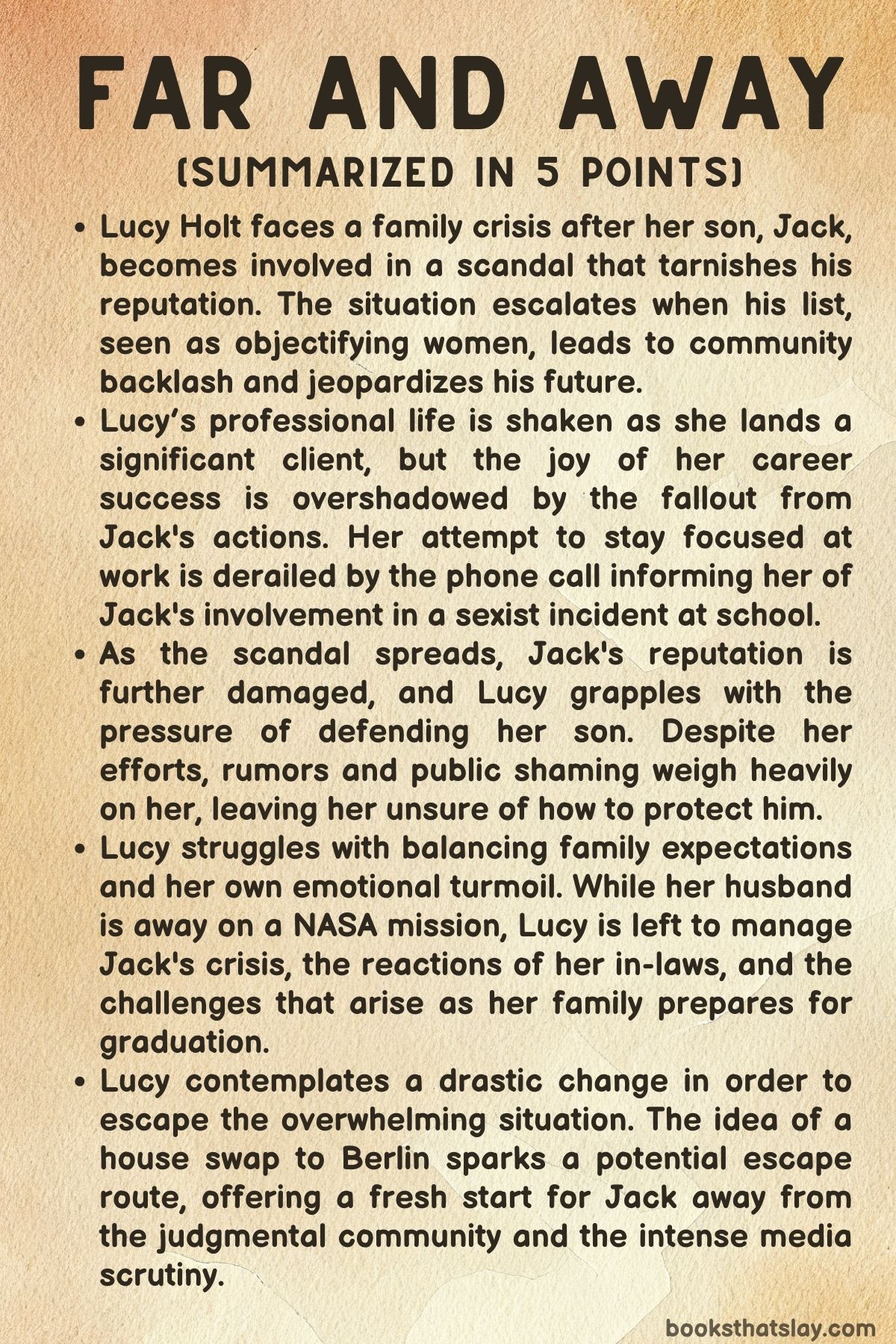Far and Away Summary, Characters and Themes
Far and Away by Amy Poeppel is a contemporary family drama that explores the lives of two women, Lucy Holt and Greta, who find their worlds turned upside down due to complex personal and professional challenges. Lucy, a mother grappling with her son Jack’s scandalous behavior, and Greta, a German woman in the midst of a move to the U.S., exchange homes in an unexpected house swap.
As both women struggle with their own sets of problems, they begin to realize that their lives are more interconnected than they ever could have imagined. Far and Away offers a look at the intricacies of motherhood, relationships, and the pursuit of personal reinvention.
Summary
The story primarily follows Lucy Holt, a mother who is trying to manage the fallout from her son Jack’s involvement in a scandal at his high school. As graduation approaches, Lucy’s life begins to unravel when Jack, a bright student with an MIT acceptance, creates a list with disturbing implications.
In the list, Jack calculates how much money the most popular girls in his class would need to invite him to their graduation parties. The list is discovered and misinterpreted as a sexist attempt to put prices on the girls, which sparks public outrage, especially from the Burton family, one of the school’s most influential families.
While Lucy struggles with the fallout from Jack’s actions, her professional life seems to offer a brief distraction. She has just landed a big client at work—securing a deal with Laurel Hotels for a Scandinavian-style hotel concept, a project she’s proud of despite opposition from her colleagues.
However, her small celebration is soon interrupted by a call from the school principal, informing her that Jack is in trouble for the controversial list. Lucy rushes to the school to find Jack visibly distressed and struggling to comprehend the weight of the situation.
At home, the situation only worsens. Jack’s reputation is tarnished, and he faces the possibility of being suspended, which would complicate his chances of graduation.
Lucy is forced to juggle her professional obligations while also trying to support her son through this crisis. On top of that, she must manage the expectations of her family, including her in-laws, who have come to town for the graduation weekend.
Despite their attempts at lightheartedness, the tension remains palpable as Jack’s behavior continues to make headlines.
As rumors spread, Jack is labeled as a “pervert” by some of his peers and members of the community. One of the most vocal critics is Janice Burton, whose daughter Cynthia is one of the girls mentioned in Jack’s list.
Overwhelmed by the accusations, Jack considers emailing MIT to explain his side of the story, but Lucy is unsure how to approach the situation. She is frustrated by the way the community has turned against Jack without giving him the chance to explain himself.
Lucy’s emotional toll intensifies as she tries to navigate the situation. One particularly devastating blow comes when Janice Burton sends her a message about Jack’s exclusion from the graduation ceremony.
At the same time, Lucy’s husband Mason is away on a NASA mission, making it difficult for her to rely on him for support. The situation becomes even more complicated as Lucy struggles to maintain some normalcy for her other children, the twins, who are also affected by the scandal.
As Jack’s life continues to spiral, the tension escalates further when Jack’s car is egged by some angry students. The situation becomes even more volatile when Lucy discovers a social media post from Cynthia, in which she claims that Jack views women as objects.
This only fuels the public outrage and makes the possibility of an escape even more appealing to Lucy. She receives an offer from a friend about a potential house swap in Berlin, which sparks an idea.
Lucy begins to consider leaving Texas behind, hoping that relocating to Berlin might provide Jack with a fresh start away from the judgment and scrutiny that has taken over their lives.
The idea of moving to Berlin starts to feel like the only way out, and Lucy is desperate for a change of scenery. Amid the turmoil, she struggles to maintain a sense of stability for her family.
As Lucy continues to wrestle with the mounting pressure, she becomes determined to find a way to protect her son and, perhaps, escape from the growing negativity surrounding their lives. The idea of a house swap, though unconventional, presents an opportunity for Lucy to leave everything behind and try to rebuild.
In parallel, the story also follows Greta, a German woman who, along with her husband Otto, is in the process of preparing for an unexpected move from Berlin to Dallas, Texas. Greta has reluctantly agreed to swap homes with Lucy, and her journey begins with frustration and uncertainty.
She has a difficult relationship with her sister Bettina and is clearly apprehensive about the decision to house-swap with someone she barely knows. Greta is concerned about the safety of her apartment while Lucy stays in her Berlin home, but her focus remains on the emotional and logistical challenges of the upcoming move.
Greta’s emotional struggles stem from her complex relationship with Otto, her husband, and the impending separation from her daughter, Emmi. While Greta prepares to leave Berlin, she finds herself reflecting on the changes in her life.
Emmi, who is becoming more vocal about gender equality and feminist issues, challenges Greta’s traditional ideas, particularly when it comes to the way women are expected to behave in the household. Greta finds herself at odds with her daughter’s growing independence, which further complicates her emotional state.
While Greta is dealing with her own issues in Berlin, Lucy’s decision to leave Texas and swap homes brings her to a crossroads. She is eager to escape the chaos surrounding Jack’s scandal and her strained relationship with her husband, Mason.
With Mason away working on a Mars project, Lucy feels more isolated than ever and is drawn to the idea of starting over in Berlin, a city where she can create distance from the people and situations that have been dragging her down.
Through this house swap, the two women’s stories begin to intertwine. As Greta and Otto adjust to life in Dallas, they are confronted with the complexities of Lucy’s home, including the modern and somewhat eccentric features of the house.
Meanwhile, Lucy’s attempts to settle into life in Berlin force her to navigate a new environment while still trying to protect her family from the consequences of Jack’s actions. As both women struggle with their own emotional baggage, they come to realize that their lives are inextricably linked through the shared experience of upheaval, change, and the search for a fresh start.
The narrative concludes with both women continuing to grapple with their lives in a new country, reflecting on the uncertain future that lies ahead.

Characters
Lucy Holt
Lucy Holt is the central character of Far and Away, a woman whose life is marked by emotional complexity and crisis. She is a mother trying to cope with the fallout of her son Jack’s scandal, a situation that brings immense strain to her personal and professional life.
Lucy’s struggle is rooted in her desire to protect her family, especially Jack, whose reputation has been tarnished due to a misunderstanding at school. As the scandal unfolds, Lucy’s emotional toll becomes evident, particularly in her efforts to maintain some semblance of normalcy for her family, including her other children, Zoe and Alice.
Lucy’s internal conflict centers around balancing her need to support Jack while dealing with the pressures of her career and strained relationships, particularly with her husband Mason, who is away on a NASA mission. Throughout the story, Lucy’s resilience shines through, as she continually tries to make the best decisions for her children despite feeling isolated and overwhelmed.
The idea of leaving Texas for Berlin represents her desire for escape and a fresh start, highlighting her willingness to fight for her family’s future, even if it means leaving behind the life she’s known.
Jack Holt
Jack Holt is Lucy’s son and the source of much of the family’s turmoil. A bright student with great potential, Jack’s involvement in a scandal at his school—a list he created that was misunderstood as sexist—throws his life into disarray.
His character is caught between guilt and confusion as the community turns against him, and he grapples with the consequences of his actions. Jack is depicted as a sensitive teenager who didn’t intend harm, but whose actions were blown out of proportion.
His emotional struggles are compounded by the public outrage and his sense of alienation. As the tension rises, Jack faces the reality that his future, including his acceptance to MIT, may be jeopardized due to the scandal.
His character’s complexity is highlighted by his desire to apologize and clear his name, yet the weight of the situation leads him to question his place in the world. The shame and guilt he experiences create a profound emotional burden, and by the end of the story, his journey is one of learning from mistakes and navigating the path to redemption.
Greta
Greta is a German woman who, along with her husband Otto, undergoes a significant life change by moving from Berlin to Dallas as part of a house swap with Lucy. Greta’s character is defined by her emotional struggles with both her family and herself.
She is caught between a sense of nostalgia for her life in Berlin and the discomfort of adapting to a new life in Texas. Greta’s personal turmoil is evident in her strained relationship with her husband Otto, as well as her complex emotional ties to her daughter Emmi.
Her relationship with Otto is marred by growing dissatisfaction, with Greta feeling disconnected from him due to their different priorities and unresolved issues. Greta’s intellectual pursuits, such as her research on Vermeer, further reflect her desire for independence and her longing for something more than the conventional domestic life.
As she navigates her own emotions and the challenges of living in a foreign environment, Greta is forced to confront the unresolved tensions in her relationships and her deep sense of displacement. By the end of the story, Greta’s journey is one of self-reflection, as she must come to terms with her own desires and the shifting dynamics of her family.
Otto
Otto is Greta’s husband, and while he appears to be a steady presence in her life, his own personal and professional struggles reveal a deeper complexity. Otto’s character is defined by his work pressures and a sense of duty to his family, but his relationship with Greta is increasingly strained.
His involvement in a professional scandal involving accusations of fraud weighs heavily on him, adding to his internal conflict. His reactions to Greta’s emotional needs, especially her intellectual pursuits, show that he is often dismissive and disconnected from her desires.
Otto’s character also struggles with a sense of loss, as the move to Dallas represents both a professional opportunity and a painful separation from the life they had in Berlin. Throughout the story, Otto’s character arc reflects a man who is burdened by the expectations placed on him, but who struggles to connect with his wife and daughter in meaningful ways.
Emmi
Emmi is Greta’s daughter, a young woman navigating the complexities of adolescence and her growing sense of identity. Her relationship with her mother is central to the narrative, as she challenges Greta’s traditional views on gender roles and societal expectations.
Emmi’s feminist views and her outspoken nature about gender equality put her at odds with Greta, especially as she criticizes her mother’s role in reinforcing outdated norms. This mother-daughter tension is amplified by Emmi’s growing independence, as she begins to forge her own path, one that sometimes clashes with her mother’s more conventional ideas.
Emmi’s journey is marked by her desire for personal agency, as she questions the roles that have been imposed on her as a woman. Her character is also shaped by the scandal surrounding Jack, as she becomes involved in the gossip and judgment about him, which complicates her relationship with Greta further.
Emmi’s emotional journey is one of rebellion and self-discovery, as she seeks to define herself in a world where her mother’s influence is still strong, but increasingly questioned.
Mason Holt
Mason Holt, Lucy’s husband, is largely absent throughout the story, as he is away working on a NASA project on Mars. Despite his physical absence, Mason’s influence on the family is felt deeply, as his work and sudden rise to fame complicate Lucy’s emotional landscape.
His status as the “Sexiest Man Alive” adds a layer of complexity to his character, as it shifts the dynamics of his relationship with Lucy. Mason’s detachment from the family is not only physical but emotional, as Lucy is left to handle the fallout from Jack’s actions and the family’s unraveling situation on her own.
Mason’s return towards the end of the story signifies a moment of reconciliation and healing, but it is also clear that his presence, while important, does not completely resolve the tensions within the family. Mason’s character represents the theme of disconnection, as his absence and sudden rise to fame highlight the emotional distance between him and Lucy, which they both must navigate moving forward.
Rex Holt
Rex Holt is Lucy’s father, and while his role in the story is secondary, his character adds depth to the family dynamic. He is portrayed as somewhat detached and dismissive of the severity of the situation, particularly when it comes to Jack’s scandal.
Rex’s humor, often used to downplay the crisis, contrasts with Lucy’s serious approach to the problem. His role as a father-in-law and his relationship with Lucy reflect the generational divide, with Rex offering a more carefree perspective, which at times clashes with Lucy’s sense of urgency and responsibility.
Rex’s character also highlights the tension between different generational attitudes towards problems and solutions, providing a contrast to the more intense and involved roles of other family members.
Themes
Motherhood and Sacrifice
Throughout Far and Away, the theme of motherhood is explored through Lucy’s experiences as a mother who is forced to navigate the complexities of raising children, especially when faced with a crisis. Lucy’s love for her son Jack drives many of her actions, but as the scandal surrounding him grows, her role as a protector and support system is tested to its limits.
The story examines how her deep emotional bond with her children compels her to make decisions that are not always easy or clear-cut. The emotional toll of being a mother in times of crisis becomes particularly evident as Lucy works tirelessly to manage Jack’s issues, the gossip surrounding his scandal, and the expectations from her family.
She sacrifices her own peace of mind to safeguard his future, reflecting a larger narrative about the selflessness inherent in motherhood.
In addition to protecting her son, Lucy’s character also underscores the idea of the personal sacrifice mothers often make. Lucy is faced with the weight of trying to balance her own career and personal aspirations, while her husband Mason’s absence adds to her burden.
The complexities of maintaining a career, a family life, and a sense of self in the midst of turmoil highlight the constant sacrifice Lucy is making as a mother. Her struggles are compounded by the isolation she feels, both physically, with Mason away, and emotionally, as she feels cut off from her support system.
Her decisions are shaped by her desire to protect her children, even when it means enduring tremendous hardship.
The theme of sacrifice is also mirrored in the characters of Greta and Emmi. Greta’s emotional journey as a mother navigating a disconnect from her daughter Emmi brings attention to the evolving nature of motherhood.
As Emmi grows into a young woman with her own values and beliefs, Greta is forced to confront the generational divide and reevaluate her role as a mother. Emmi’s growing independence represents a new chapter in motherhood, where the dynamic shifts, and Greta must come to terms with the idea that protecting her daughter might no longer be as simple as it once was.
Identity and Self-Discovery
Identity and the quest for self-discovery are central themes in Far and Away, particularly through the experiences of both Lucy and Greta. Lucy’s journey in the book is largely shaped by her efforts to redefine herself amid her tumultuous personal life.
With her husband Mason’s absence due to his involvement in the Mars project, Lucy is left to cope with the chaos of raising her children while facing a public scandal. Her decision to leave Dallas and move to Berlin represents an attempt to rediscover a sense of control and agency in her life.
It is in this new setting that Lucy grapples with her identity as a mother, wife, and individual, trying to figure out how to reconcile these roles.
The tension between Lucy’s personal desires and the expectations placed on her as a mother reveals the internal conflict many women face. She wants to protect her son and fix the situation he’s created, but she also seeks space to understand who she is outside of her responsibilities as a mother.
In Berlin, far away from the judgment of her community, Lucy faces the opportunity to explore her own sense of self, even though her circumstances weigh heavily on her. The choice to leave behind her life in Texas symbolizes the desire for personal reinvention and the search for meaning beyond the confines of societal expectations.
Greta’s narrative is also rich in themes of self-discovery, particularly as she deals with her discontentment with her family life. Her relationship with her husband Otto is strained, and her sense of self is continually challenged by her role as a mother and wife.
Greta’s intellectual pursuits, such as her research into Vermeer’s art and her exploration of feminist ideas, further reveal her struggle to establish an identity beyond her family. Her interactions with Emmi, who is becoming more vocal about gender inequality and feminism, force Greta to confront her own ingrained beliefs and rethink the role she plays in the world around her.
Greta’s story is a reflection of the tension between the roles society expects women to play and the desire to forge a personal identity.
Gender and Societal Expectations
The theme of gender roles and societal expectations runs throughout Far and Away, particularly through the characters’ interactions and their evolving sense of self in relation to societal norms. Emmi’s emergence as a feminist voice challenges the established norms within her family, particularly in her interactions with Greta.
Emmi’s advocacy for gender equality and her criticisms of her mother’s role in reinforcing traditional gender roles shed light on the evolving expectations of women in society. Emmi’s growing independence and desire to challenge the status quo reflect the changing dynamics of gender in modern relationships and highlight the generational shift in how women perceive their roles in both the family and society at large.
This theme is also explored through the scandal surrounding Jack. His actions, which are rooted in a sexist perspective, become a flashpoint for examining how men and women are treated differently in society.
Jack’s behavior exposes the toxic masculinity that is often perpetuated through societal expectations and pressures, which leads to the backlash he faces. The way Jack is labeled and shamed by the community reflects the broader issue of how individuals, particularly young men, are conditioned to view women.
Lucy’s attempts to defend her son highlight the complexities of navigating gender expectations as a mother and the conflict between protecting her child and confronting the damaging effects of his actions.
On a broader scale, the novel critiques how gender norms shape not only individual lives but also collective perceptions. Greta’s reflection on her own gendered experiences, from her relationship with her husband to her intellectual pursuits, highlights the subtle and often unspoken ways in which women are expected to behave, both at home and in the workplace.
The characters’ struggles with these expectations form the backbone of the narrative, as they question the roles they have been assigned and seek ways to reshape their futures according to their own desires and beliefs.
Relationships and Emotional Complexity
Relationships form the emotional core of Far and Away, exploring the complexities of familial and romantic ties. The story delves into the nuances of these relationships, particularly through the lens of Lucy’s and Greta’s interactions with their respective families.
The emotional strain between Lucy and her husband Mason is a focal point of the narrative, with his absence due to his work on the Mars project creating a rift between them. Mason’s growing fame only adds to the tension, as Lucy feels increasingly isolated and disconnected from him.
The emotional complexity of their relationship is amplified by the circumstances of their lives, where communication and connection become strained, yet the desire for reconciliation and understanding remains.
Greta’s relationship with her husband Otto also highlights the emotional challenges couples face as they navigate personal and professional upheavals. The couple’s move to Texas is symbolic of the distance growing between them, and their individual emotional struggles reflect the larger theme of emotional disconnection.
Despite their shared history, Greta and Otto find themselves questioning the stability of their relationship and the choices they have made. The tension between them is intensified by their individual desires for change and fulfillment, which are often at odds with their responsibilities to one another.
The bond between mothers and children is another crucial aspect of emotional complexity in the novel. Lucy’s relationship with her children, especially Jack, becomes increasingly strained as the scandal threatens to tear apart their family.
Despite the difficulties, Lucy’s protective instincts and desire to keep her family together reflect the deep emotional ties that bind them. Greta’s evolving relationship with her daughter Emmi also mirrors the broader theme of emotional growth and change, as both mother and daughter struggle to navigate their shifting roles and understand each other.
These relationships showcase the ways in which love, sacrifice, and emotional complexity shape the characters’ journeys, ultimately revealing the deep layers of connection and tension that define their lives.


